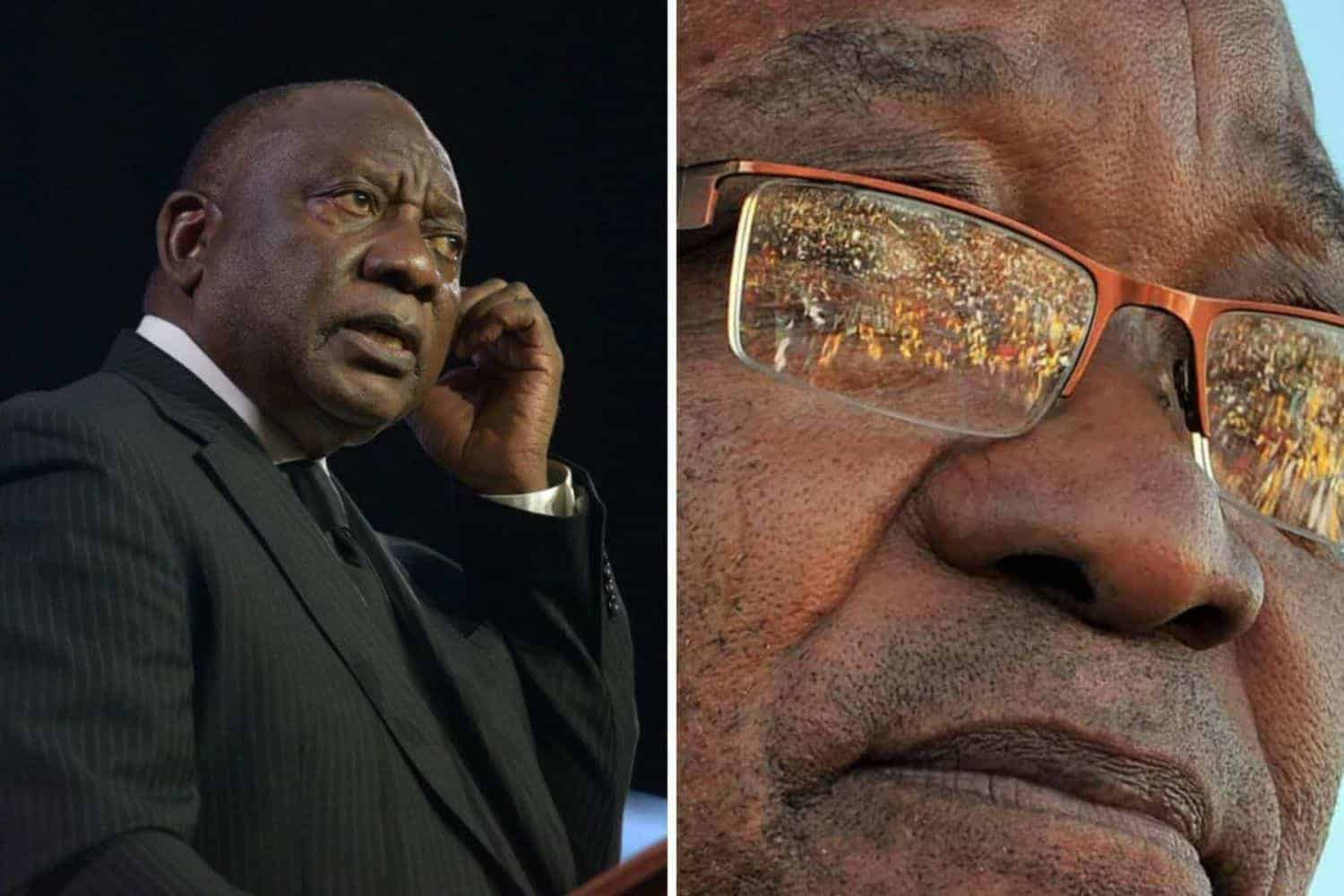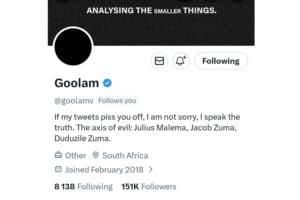The application by Zuma and the MK party comes after their recent loss in the Constitutional Court.

Former president Jacob Zuma and the MK party have not given up the fight and have lodged an urgent application against President Cyril Ramaphosa in the High Court in Pretoria.
The application by Zuma and the MK party comes after their recent loss in the Constitutional Court.
What Zuma wants
In the notice of motion, Zuma and his party want the high court to declare Ramaphosa’s decision to place Minister of Police Senzo Mchunu on special leave. They also want the appointment of Wits law Professor Feroz Cachalia as acting police minister and the establishment of a commission of inquiry to be declared invalid, null and void and unconstitutional and set aside.
ConCourt ruling
The ConCourt on 31 July 2025 ruled that the application does not engage the court’s jurisdiction and refused direct access to the MK party and Zuma in its matter against Ramaphosa.
Ramaphosa’s lawyer Kate Hofmeyr argued that cases that can exclusively be decided by the Constitutional Court are very limited.
“This matter does not fall within this court’s exclusive jurisdiction. Very few matters do, and this is not one of them.
“Any allegation that the power was exercised unlawfully falls under our constitutional scheme to the High Court and the Supreme Court of Appeal (SCA) to consider first. Additionally, there is no pressing need for this court, on 10 days’ notice, to decide the issues in this matter as a court of first and last instance,” Hofmeyr said.
This basically means that Zuma and the MK party had to approach the high court first, which they have now done.
ALSO READ: Zuma and MK party case should’ve started in High Court, ConCourt hears [VIDEOS]
The court ruling was handed down two hours after it hosted a special ceremonial sitting for retiring Acting Deputy Chief Justice Mbuyiseli Madlanga, whom Ramaphosa appointed to chair a commission to probe explosive allegations by KwaZulu-Natal (KZN) top cop Lieutenant-General Nhlanhla Mkhwanzi of criminal infiltration in the South African justice system.
Constitutional matter
In his founding affidavit to the high court, Zuma said he is bringing the application in his personal capacity, but because the application is urgent and in the “interest of justice” he is also deposing the papers on behalf of the MK party.
“The twin purposes of this application are to re-assert the merits of the application which were left unadjudicated by the Constitutional Court on account of its findings on exclusive jurisdiction and direct access; and to raise new grounds of illegality and irrationality based on events which arose post the 30 July 2025 hearing in the Constitutional Court,” Zuma argues.
Zuma said that the present application is indisputably a constitutional matter.
Section 169(1)(a) of the Constitution provides that the High Court of South Africa may decide any constitutional matter except a matter that the Constitutional Court has agreed to hear by way of direct access or is assigned by legislation to another court of a status similar to the High Court.
“This is such a matter because the Constitutional Court, rightly or in my view wrongly, declined to grant direct access. That decision must be respected as a fact until or unless it is set aside,” Zuma said.
ALSO READ: Zuma and MK party accuse ConCourt of ignoring ‘most serious’ violations by Ramaphosa
Urgency
In his papers, Zuma argues that in his Constitutional Court application, Ramaphosa did not contest the urgency, exclusive jurisdiction, and/or direct access.
“The president sought and was allowed to opportunistically hide behind those technicalities to escape much-needed judicial accountability for the unjustifiable multiple breaches of the rule of law. There are no more hiding places.
“The serious and unprecedented revelations of alleged criminality made by Lieutenant-General Mkhwanazi, as another highly qualified whistleblower, in the tradition of former Intelligence Chief Arthur Fraser, can no longer be ignored or swept under the carpet at the request of the president,” Zuma argued.
Zuma explains that the urgency of the application is “clearly not self-created, and it can never be reasonably asserted that relief may be obtained in due course.”
“The impugned commission has already commenced and continues to operate at huge cost to the taxpayer. In the (unlikely) event of its delivering a final report in six months’ time, the matter would still not have been heard in due course.”
Cachalia
Zuma also argues that Cachalia has since assumed office and will be “making decisions which affect the security of the people of South Africa” while Mchunu “who has been illegally placed on leave of absence by the president continues to earn a salary and enjoy other expensive privileges such as bodyguards, drivers, free ministerial accommodation, air travel domestic workers and the like.”
“It is trite that the matter involves very serious and unprecedented allegations of executive and judicial capture which, if true, constitute a threat to the very democracy prevailing in South Africa.
“It is impossible to imagine a greater catastrophe than that which would transpire if the allegations are true and the matter is not heard as one of the utmost urgency. In relation to the question of urgency, the merits must be regarded as true and proven,” Zuma argues.
Senzo Mchunu
Zuma also argues that there is “no express legal provision which empowers Ramaphosa to place a minister on leave of absence.
“The respondents can therefore only rely on an implied power which is said to flow from the power to dismiss.
“It will be argued that the decision does not pass the reasonable necessity test because the power to dismiss in section 91(2) must not be confused with the power to dismiss an employee,” he said.
‘Financial benefit’
Zuma said the appointment of Cachalia is “totally incoherent” and false explanations given by Ramaphosa in “respect of this decision owe to the fact that it is rooted in improper motives and bad faith”.
“Its purpose if to grant undue financial benefits to Minister Mchunu at the expense of the taxpayer and to shield him from accountability and well-deserved dismissal or removal from the Cabinet.
“In explaining this appointment, the president has performed both somersaults and backflips in a series of incompatible volte face manoeuvres, all pointing to sheer irrationality,” Zuma argued.
In his papers, Zuma argued that following the swearing in of the acting police minister, both Ramaphosa and Cachalia gave media interviews, with differing accounts of his official title and status.
Questions to Ramaphosa
Zuma’s attorneys sent a letter to Ramaphosa on 4 August 2025, posing 15 unanswered questions regarding his actions and justifications. Zuma said Ramaphosa’s response was “inadequate”.
“Given the public importance of the issues and the imminence of the 1 August date for the assumption of office by Professor Cachalia, the matter cries out for direct access.”
ALSO READ: Zuma demands Ramaphosa resign by Friday, or else…
Madlanga Commission
Zuma also argues that there is no legal provision which is capable of endowing the president with the power to confer upon the Madlanga Commission the powers which are reserved to the Judicial Service and/or Magistrates’ Commissions, to investigate allegations of misconduct on the part of members of the judiciary.
“There are specific and well-accepted policy reasons why such powers are exclusively reserved for the bodies referred to above. These include the preservation of the independence, dignity and effectiveness of the judiciary.”
The matter is expected to heard on 26 August 2025.
ALSO READ: Madlanga inquiry: How much probe into Mkhwanazi’s allegations will cost






